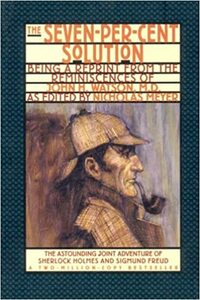Take a photo of a barcode or cover
adventurous
mysterious
fast-paced
Plot or Character Driven:
A mix
Strong character development:
Yes
Loveable characters:
Yes
Diverse cast of characters:
No
Flaws of characters a main focus:
Yes
adventurous
medium-paced
Watson takes Holmes to Sigmund Freud to cure Holmes of his cocaine addiction. While in Vienna, they stumble upon the plight of a kidnapped woman and a plot that could have far-reaching political consequences
Moderate: Drug abuse
The writing style was wonderful, and pays good homage to Sir ACD. Though I expected more interaction between Holmes and Freud, it was nevertheless a good read.
A bit of a slow start but gains speed quickly. Very enjoyable.
The voice is wrong. There are parts that sound like Watson, but there are many more that don't. The story was amusing, and the connections to Sherlockian analysis (that I have access to through the annotated book I'm reading) were great. There were moments I was reminded of a line from Doctor Who about how thousands of literary researchers are pumping the air right now (after a revelation about Shakespeare's life).
So, the book. It purports to be a long lost story written by Watson about what really happened when Holmes disappeared. The book is short, well written, and interesting. The perfect combination for a quick read. The author was careful to allow for people reading the story without knowing much about Holmes' life while still throwing tidbits at the wall for those that do.
So, the book. It purports to be a long lost story written by Watson about what really happened when Holmes disappeared. The book is short, well written, and interesting. The perfect combination for a quick read. The author was careful to allow for people reading the story without knowing much about Holmes' life while still throwing tidbits at the wall for those that do.
Sherlock Holmes and the case of the deadly cocaine addiction!
This was more of a novella than a novel, very short. At first I didn't like it; it assumed you had obsessive Sherlockania information that you didn't necessarily have, and it seemed like cheap opportunism: let's analyze Sherlock! But the book gets into the realm that's always been kind of a crux in mystery novels: physical clues vs. motivation/profiling. Do we need to understand the criminals in order to catch them? And Sherlock's time with Freud is handled with far more compassion and delicacy than I anticipated. The end was a chase scene pointing toward the events of WWI and felt kind of tacked on. So I'll sum up with a four and note that your mileage may vary greatly depending on how much Sherlock Holmes you've been reading lately.
This was more of a novella than a novel, very short. At first I didn't like it; it assumed you had obsessive Sherlockania information that you didn't necessarily have, and it seemed like cheap opportunism: let's analyze Sherlock! But the book gets into the realm that's always been kind of a crux in mystery novels: physical clues vs. motivation/profiling. Do we need to understand the criminals in order to catch them? And Sherlock's time with Freud is handled with far more compassion and delicacy than I anticipated. The end was a chase scene pointing toward the events of WWI and felt kind of tacked on. So I'll sum up with a four and note that your mileage may vary greatly depending on how much Sherlock Holmes you've been reading lately.
As a fan of Nicholas Meyer’s work on Star Trek, I was always curious about the work that made him famous, his Sherlock Holmes novel “The Seven-Per-Cent Solution.” I’d read all of Sir Arthur Conan Doyle’s original Sherlock Holmes stories when I was younger, and have watched BBC’s recent “Sherlock” series, but I admit I’m not an aficionado or expert, so I’m judging this more as an independent work of fiction rather than a piece of Sherlock lore.
I actually really liked the premise of the story, which is basically that Holmes’ drug addiction causes him to grow increasingly paranoid. In this version of Holmes, Prof. Moriarty isn’t an evil genius, but rather the innocent object of Holmes’ delusions. In order to cure Holmes, Watson brings him to one Dr. Sigmund Freud. There’s some entertaining banter between the two brilliant minds about how their methods of deduction overlap and complement each other.
There’s an aspect to which a Freud/Holmes paring comes across as something you’d expect in “fan fiction,” but that’s kind of the point in this type of pastiche. If you read this book intent on treating it as part of Holmesian canon, then you’ll probably be frustrated. But it is an entertaining and interesting use of the Holmes archetype.
I found myself far less invested in the “mystery” Holmes and Freud team up to solve. There’s some mad dash to foil the plans of a European arms dealer, but it all feels like the stuff of a generic action movie. No matter how hard it tries to convince readers that THIS case is one of the most important in Holmes’ career, the fact that World War I occurred soon after casts a shadow over the whole affair.
[Note: I received a free copy of this book from the publisher in exchange for an honest review]
I actually really liked the premise of the story, which is basically that Holmes’ drug addiction causes him to grow increasingly paranoid. In this version of Holmes, Prof. Moriarty isn’t an evil genius, but rather the innocent object of Holmes’ delusions. In order to cure Holmes, Watson brings him to one Dr. Sigmund Freud. There’s some entertaining banter between the two brilliant minds about how their methods of deduction overlap and complement each other.
There’s an aspect to which a Freud/Holmes paring comes across as something you’d expect in “fan fiction,” but that’s kind of the point in this type of pastiche. If you read this book intent on treating it as part of Holmesian canon, then you’ll probably be frustrated. But it is an entertaining and interesting use of the Holmes archetype.
I found myself far less invested in the “mystery” Holmes and Freud team up to solve. There’s some mad dash to foil the plans of a European arms dealer, but it all feels like the stuff of a generic action movie. No matter how hard it tries to convince readers that THIS case is one of the most important in Holmes’ career, the fact that World War I occurred soon after casts a shadow over the whole affair.
[Note: I received a free copy of this book from the publisher in exchange for an honest review]
nice mix of historical characters but could have been better
I almost gave this four stars because I just love anything that can add to my love/obsession with Sherlock Holmes. The story was enjoyable, I liked having Freud in the story to try and unravel something of that great detective's untold story. However, I simply feel that no one I have read so far has been able to capture the tone and feel of the characters the way Doyle did, and it lacked authenticity to me. It captured my imagination and I appreciated it's creativity, but speculation about Sherlock has always left me a bit disappointed, as was the case here.





